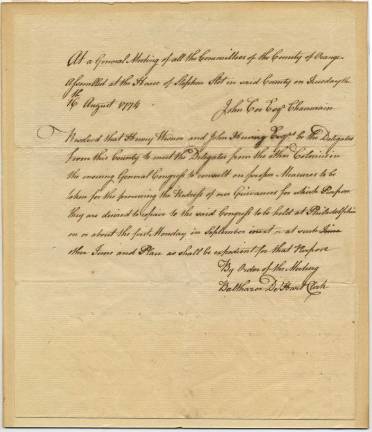Why didn't Henry Wisner sign the Declaration of Independence?

Upon seeing the “In Congress, July 4,1776” Viewpoint article, I thought of Orange County’s delegate to the Continental Congress: Henry Wisner.
James G. Sweeney provided a short bio of Henry Wisner in part one of the “Wawayanda v. Cheescock, Orange County’s “Trial of the (18) Century” Orange County Historical Society Journal Volume #27, published 1998"
"Henry Wisner (1720-1790) was a native of Goshen, Orange County. He is remembered as one of Orange County's most notable public servants. He had little formal schooling but quickly rose in prominence in the Orange County area. He had large land holdings in the Goshen area, the very heart of the Wawayanda patent.
"He served as an associate Judge of the Court of Common Pleas (date unknown) and in the Colonial Assembly from 1759 to 1769. He served as a delegate in the extra-legal Provincial Congress in 1775-77 and as a delegate from New York in the Continental Congress in 1774-76. He voted for the Declaration of Independence but was not in Philadelphia for its signing because at that time he was at the New York Provincial Congress. He served on the committee to draft the first State Constitution in 1776-77 and served as a Senator in the NY Senate from 1777-1782.
"During the War he established several powder mills in Orange and Ulster Counties to supply the Continental Army. He used his own considerable fortune to lend money to the War effort. He participated in the planning for the laying of chains across the Hudson River and West Point. Like so many other participants in the Wawayanda-Cheesecock story he was a delegate to the State ratifying convention at Poughkeepsie in 1788 voting against its adoption as being too oriented to a centralized federal power structure. "He served on the first Board of Regents of the State from 1784-1787. He also served on the commission established to settle the New York and New Jersey State boundary. He died at his farm in the Phillipsburgh area near Goshen at 70 years of age in 1790."
In part Two, 1999, Sweeney added:
"It was at Sloat's Tavern in Aug. 1774 that John Herring of Tappan (a Commissioner in these proceedings) and Henry Wisner of Goshen (a member of the Committee for Wawayanda) were selected as delegates to the Continental Congress in Philadelphia which eventually adopted the Declaration of Independence in July 1776 After the war, the Tavern became an important meeting place for public officials and public conventions in the Southern Orange County area. Sloat's Tavern was one of five that were located along the Clove Road — Sidman's, Sloat's Galloway's, June's and Smith's. The names of Van Deusen, Sidman and Sloat figure prominently throughout the testimony at these proceedings."
See “Henry Wisner and the war,” The Chronicle, published Friday, March 2, 2001.
Clifton Patrick
Town of Chester Historian